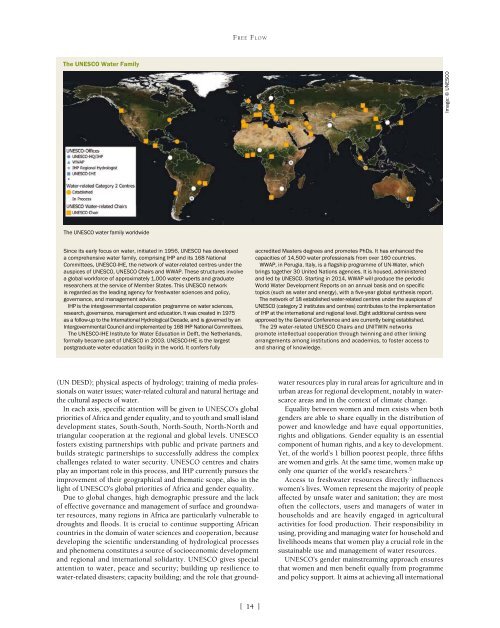222893e
222893e
222893e
You also want an ePaper? Increase the reach of your titles
YUMPU automatically turns print PDFs into web optimized ePapers that Google loves.
FREE FLOWThe UNESCO Water FamilyImage: © UNESCOThe UNESCO water family worldwideSince its early focus on water, initiated in 1956, UNESCO has developeda comprehensive water family, comprising IHP and its 168 NationalCommittees, UNESCO-IHE, the network of water-related centres under theauspices of UNESCO, UNESCO Chairs and WWAP. These structures involvea global workforce of approximately 1,000 water experts and graduateresearchers at the service of Member States. This UNESCO networkis regarded as the leading agency for freshwater sciences and policy,governance, and management advice.IHP is the intergovernmental cooperation programme on water sciences,research, governance, management and education. It was created in 1975as a follow-up to the International Hydrological Decade, and is governed by anIntergovernmental Council and implemented by 168 IHP National Committees.The UNESCO-IHE Institute for Water Education in Delft, the Netherlands,formally became part of UNESCO in 2003. UNESCO-IHE is the largestpostgraduate water education facility in the world. It confers fullyaccredited Masters degrees and promotes PhDs. It has enhanced thecapacities of 14,500 water professionals from over 160 countries.WWAP, in Perugia, Italy, is a flagship programme of UN-Water, whichbrings together 30 United Nations agencies. It is housed, administeredand led by UNESCO. Starting in 2014, WWAP will produce the periodicWorld Water Development Reports on an annual basis and on specifictopics (such as water and energy), with a five-year global synthesis report.The network of 18 established water-related centres under the auspices ofUNESCO (category 2 institutes and centres) contributes to the implementationof IHP at the international and regional level. Eight additional centres wereapproved by the General Conference and are currently being established.The 29 water-related UNESCO Chairs and UNITWIN networkspromote intellectual cooperation through twinning and other linkingarrangements among institutions and academics, to foster access toand sharing of knowledge.(UN DESD); physical aspects of hydrology; training of media professionalson water issues; water-related cultural and natural heritage andthe cultural aspects of water.In each axis, specific attention will be given to UNESCO’s globalpriorities of Africa and gender equality, and to youth and small islanddevelopment states, South-South, North-South, North-North andtriangular cooperation at the regional and global levels. UNESCOfosters existing partnerships with public and private partners andbuilds strategic partnerships to successfully address the complexchallenges related to water security. UNESCO centres and chairsplay an important role in this process, and IHP currently pursues theimprovement of their geographical and thematic scope, also in thelight of UNESCO’s global priorities of Africa and gender equality.Due to global changes, high demographic pressure and the lackof effective governance and management of surface and groundwaterresources, many regions in Africa are particularly vulnerable todroughts and floods. It is crucial to continue supporting Africancountries in the domain of water sciences and cooperation, becausedeveloping the scientific understanding of hydrological processesand phenomena constitutes a source of socioeconomic developmentand regional and international solidarity. UNESCO gives specialattention to water, peace and security; building up resilience towater-related disasters; capacity building; and the role that groundwaterresources play in rural areas for agriculture and inurban areas for regional development, notably in waterscarceareas and in the context of climate change.Equality between women and men exists when bothgenders are able to share equally in the distribution ofpower and knowledge and have equal opportunities,rights and obligations. Gender equality is an essentialcomponent of human rights, and a key to development.Yet, of the world’s 1 billion poorest people, three fifthsare women and girls. At the same time, women make uponly one quarter of the world’s researchers. 5Access to freshwater resources directly influenceswomen’s lives. Women represent the majority of peopleaffected by unsafe water and sanitation; they are mostoften the collectors, users and managers of water inhouseholds and are heavily engaged in agriculturalactivities for food production. Their responsibility inusing, providing and managing water for household andlivelihoods means that women play a crucial role in thesustainable use and management of water resources.UNESCO’s gender mainstreaming approach ensuresthat women and men benefit equally from programmeand policy support. It aims at achieving all international[ 14 ]


